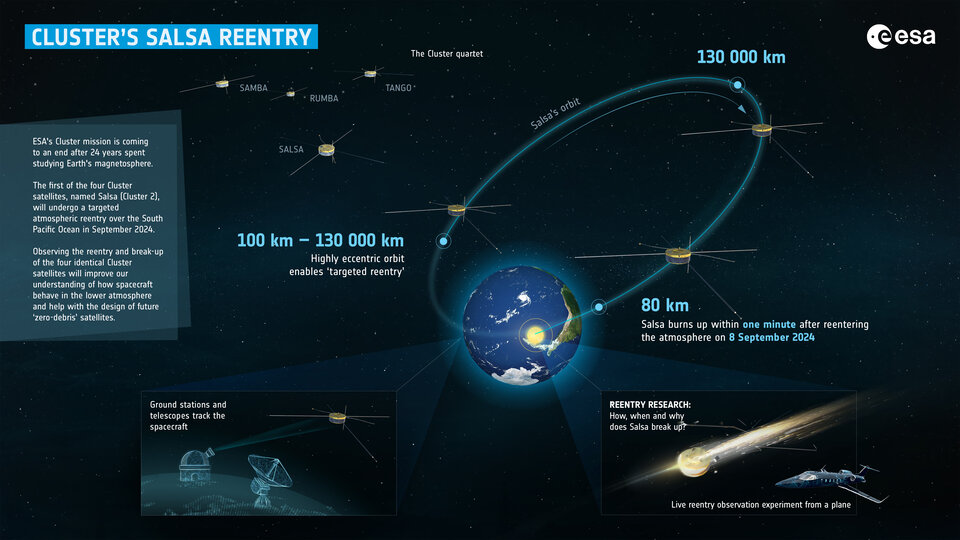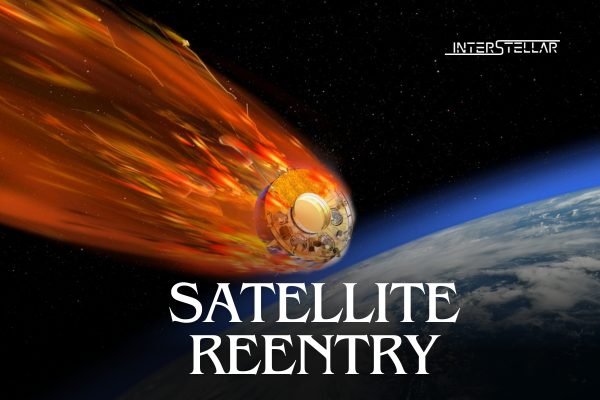ESA Prepares for Cluster Satellite Reentry Observation
On 8 September 2024, the European Space Agency (ESA) will oversee the reentry of one of its Cluster satellites, named Salsa, into Earth’s atmosphere. This event marks the first in a series of reentries for the Cluster mission, a quartet of identical satellites launched to study Earth’s magnetosphere. As the satellite makes its fiery descent over a remote part of the South Pacific Ocean, scientists aboard a small plane will attempt to observe and collect critical data on how satellites break apart during reentry.

Understanding Reentry Science
In nearly seven decades of space exploration, around 10,000 satellites and rocket bodies have reentered Earth’s atmosphere. However, there remains much to learn about the process. This reentry observation, facilitated by the ESA in collaboration with Astros Solutions, will provide a rare opportunity to gather real-time data. Such information is vital for improving the safety and sustainability of future satellite reentries.
“To keep Earth’s valuable orbits clean, it is important to remove a satellite quickly after its mission ends, preventing more space debris,” says Holger Krag, Head of Space Safety at ESA. The reentry of Salsa will help scientists understand how to design satellites that can be safely disposed of at the end of their missions.
The Complexities of Salsa’s Final Moments
Salsa’s reentry is set to be a highly controlled process, targeting a specific location in the South Pacific Ocean, far from populated areas. This careful planning aims to ensure that any surviving fragments land safely in open waters. The satellite’s orbit, which takes it close to Earth every 12 years, allowed operators to slightly adjust its trajectory in January 2024, ensuring that it will reenter the atmosphere as planned in September.
The observation mission, codenamed “ROSIE-Salsa,” will involve scientists from several universities and industry partners. They will be onboard a specially equipped plane, monitoring the reentry using over 20 scientific instruments. These tools will capture the breakup of the satellite and track its fragments, despite the challenges posed by the daytime reentry, which complicates the visibility of the event against the bright sky.
The Future of Satellite Reentry Observations
The successful observation of Salsa’s reentry could pave the way for similar missions in the future, providing essential data to enhance the accuracy of satellite reentry models. ESA’s commitment to reducing space debris is further demonstrated by their upcoming DRACO mission. This mission will involve a satellite equipped with a ‘black box’ that records data from inside the satellite during its reentry, potentially offering unprecedented insights into the reentry process.
With Salsa leading the way, the remaining Cluster satellites—Rumba, Samba, and Tango—will follow in the coming years, each targeting similarly remote reentry locations. These efforts are part of ESA’s broader Zero Debris initiative, which aims to prevent the creation of space debris by 2030, ensuring safer orbits for future generations.


